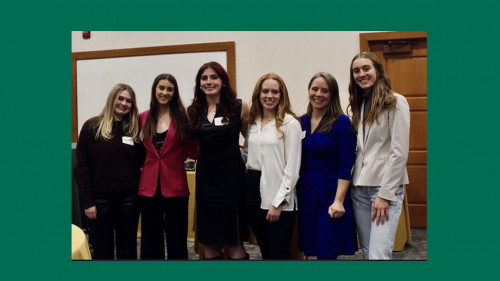
How do we embrace artificial intelligence, and what kinds of learning and leadership opportunities does AI present?
“Leadership in the Era of AI” was delivered by Jay Moore ’87, chief learning officer at General Electric, as the 2024 Lewis Golub Executive Lecture. His April 11 address, organized by the School of Business, focused on the ethical, practical, and behavioral adjustments necessary in business due to AI advancements.
“Expect continued and rapid disruptions to corporate practice by AI,” he said. “It will be leveraged to build new skills and taxonomies for organizations. Personalization will need to take center stage, along with the development needs of managers.”
Moore recalled the numerous technological advances he’s seen over the years at GE, from the company’s first online orders to building a presence on social media. Now, AI is changing the game again.
“The rate of change has rapidly accelerated,” he said.
Using the keywords Prompt, Permission and Practice, Moore encouraged the Siena audience to associate the risk inherent in change with learning, rather than fear.
“As leaders, we need to be curious as we assess risk, and engage our teams in a collective learning opportunity,” he said. “Experiment in your space, and coach each other.”
He explored ethical issues such as job displacement, deep fakes, accountability, and data bias, and used case studies of wins and fails by companies using AI. He also noted the need for self-regulation.
Kayla McNulty ’26 noted how quickly the groundbreaking technology of AI entered our lives.
“Ultimately there is no hiding from AI,” she said. “It’s faster than any social media app to date and is advancing faster than we can even keep up with. This lecture was a great opportunity for myself and my peers to gain knowledge about AI and how major companies like General Electric are implementing it into their daily operations.”
Christopher Dubon ’25 said Moore showed the audience that “this tool can be utilized to make our lives better and to see forward progression of both Siena College and society as a whole.”
“It will be interesting to see the role artificial intelligence will play in the coming years and whether or not humans will come to accept it as an aspect of everyday life or if tools like Chat GPT will become regulated or rejected,” said Dubon.
Specific to Siena, Moore highlighted the critical relevance of AI for the future of higher education. To close out the lecture, Siena Provost Margaret Madden, Ph.D. outlined several key follow-up actions for the Siena community to consider. These initiatives aim to integrate the insights from Moore’s talk into the College’s pedagogical approaches, course content, and broader institutional practices:
• Reevaluation of Educational Content and Pedagogy: The College will assess and update its curricula to ensure students develop the skills needed to navigate and lead in an AI-influenced landscape. This includes an examination of how AI can be integrated into different fields of study.
• Enhancement of Faculty Development: There will be new opportunities for faculty to collaborate and innovate in their scholarship, particularly in how they incorporate AI and ethical considerations into their teaching and research.
• Review of College Business Practices: Siena will revisit its operational policies — from student conduct to faculty course guidelines and administrative procedures — to reflect the changing dynamics introduced by AI technologies.
• Impact on Community and Social Justice: The College must also consider the broader implications of AI on community equity, such as access to technology, bias in AI tools, and the ethical management of information.

